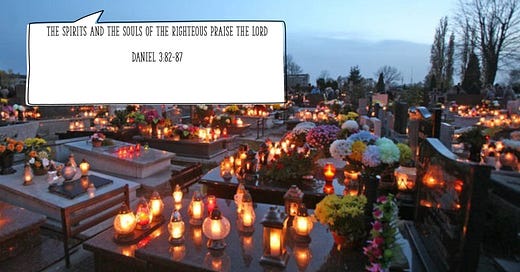The spirits and the souls of the righteous praise the Lord
December 2, 2023 - Saturday, 34th Week in Ordinary Time
Daniel 3:82-87
As we are ending the liturgical year of 2022-23, the hymn of the three young men, Shadrach, Meshach, and Abednego, who refused to worship the golden image set by the Babylonia king Nebuchadnezzar, also comes to an end. Today, the three young men are inviting all the people to worship the Lord. It is worth noting the sequence of those mentioned in today's fragment of our hymn. It begins with all people, then it focuses on Israel and within Israel, the priests and the servants of the Lord are particularly mentioned, and the last group called to praise the Lord are the pious ones and humble of heart.
But the author of the hymn also mentions "the spirits and the souls of the righteous" (Daniel 3:86). Since ancient times, this statement has been interpreted as referring to the dead and in this case we have here an ancient testimony of belief in life after death. In his encounter with the Sadducees who denied the resurrection, Jesus said that if God is called the God of Abraham, the God of Isaac, and the God of Jacob, therefore these three patriarchs had to be alive, not dead (see Mark 12:18-27). We can draw a similar conclusion from the above-mentioned verse in the book of Daniel. So that "the spirits and the souls of the righteous" can worship the Lord, they have to be alive or as Jesus put our God is not "God of the dead, but of the living" (Mark 12:27).
This belief was taken up by the followers of Christ and our Church explains it in her teaching about the immortality of the soul. In our Catechism, we read: "The Church teaches that every spiritual soul is created immediately by God - it is not "produced" by the parents - and also that it is immortal: it does not perish when it separates from the body at death, and it will be reunited with the body at the final Resurrection" (CCC, 366). Then, in another place, the mystery of death, as the separation of the soul from the body is further explained. "In death, the separation of the soul from the body, the human body decays and the soul goes to meet God, while awaiting its reunion with its glorified body" (CCC, 997).
As it is evident from these passages, we do not only believe in the immortality of the soul - a belief that is upheld by many religions and thinkers. We also believe in the resurrection of the body. The final victory of life over death is manifested in the reunion of our souls with our glorified bodies. An ancient Father of the Church, Tertullian said "The flesh is the hinge of salvation". The Church took this statement and used it to offer the following explanation. " We believe in God who is creator of the flesh; we believe in the Word made flesh in order to redeem the flesh; we believe in the resurrection of the flesh, the fulfilment of both the creation and the redemption of the flesh" (CCC, 1015).
The three young men from the flames of fire invite "the spirits and the souls of the righteous" to praise the Lord. We are looking to the time when transformed humanity - immortal souls and glorified bodies reunited - together with the entire creation will stand before the Lord and praise Him forever.




